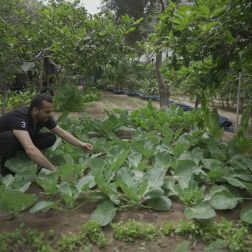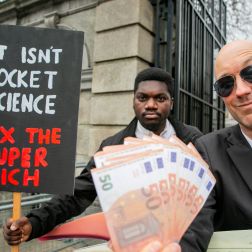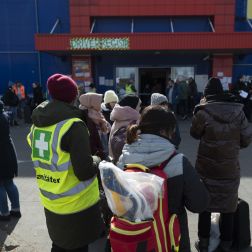- 5 mins read time
- Published: 19th August 2019
For Françoise | World Humanitarian Day 2019
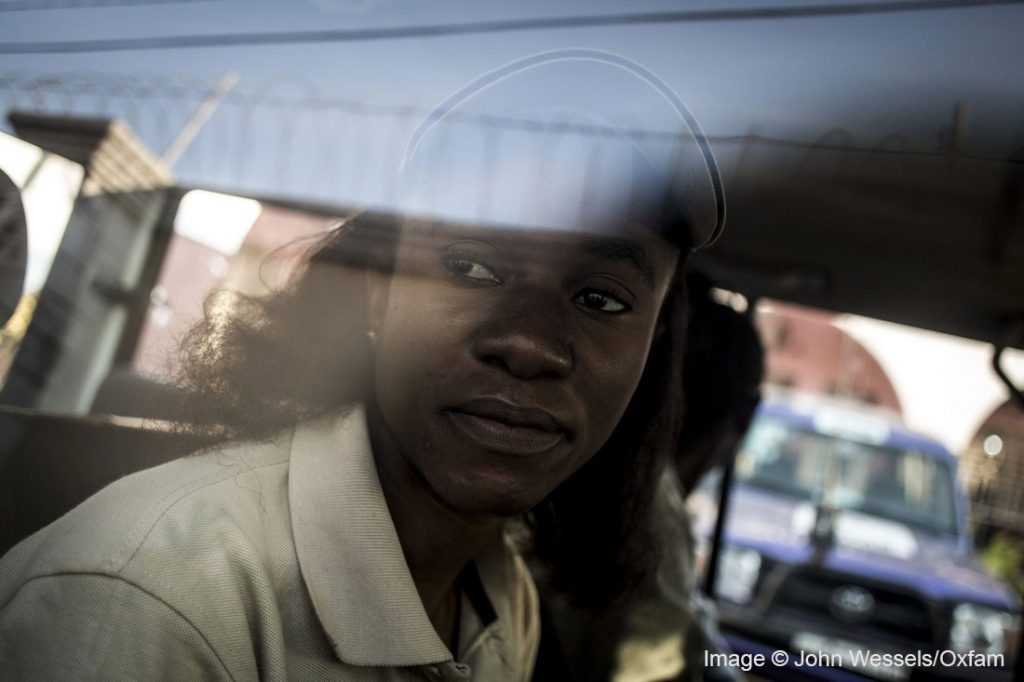 “I’m proud of the work that I do. Because when I help the population it helps me as well. We’re all the same. We have all experienced the same difficulties. So when you are able to help people you have to help them the same way you were helped. That’s it!” Françoise Kalunda (1985 – 2019) By Eleanor Farmer, Creative Producer, Oxfam GB I met Françoise Kalunda in August 2018, in eastern Democratic Republic of Congo, where she had been working for five years with Oxfam as a Public Health Promoter. 56,000 people had recently fled their homes because of a violent conflict and were now living in temporary camps. Françoise was working with a small team, ensuring people had clean water, toilets and good hygiene practices to prevent disease outbreaks. I was there to meet people who had been affected by the conflict, but also to highlight the efforts of local staff – especially women like Françoise: hidden figures, doing incredible work. Françoise agreed for us to spend the day documenting her work. It began with ‘rush hour’ at the Oxfam water point. She joined a crowd of women and children who were jostling to fill water containers from the taps. “Jambo Mama!” they called as she made her way through the crowd.She was friendly and relaxed, but focused on her work. “Please close your bucket with a lid, okay? You have to close your containers after drawing water,” she called. “Whose container is that? Wash the containers away from the water point please. Excuse me everyone, please wash your containers first, and make sure they are spotlessly clean, okay? You will all have a chance to draw water. Just leave your buckets in the queue. Let us have an organised queue please! There’s plenty of water.
“I’m proud of the work that I do. Because when I help the population it helps me as well. We’re all the same. We have all experienced the same difficulties. So when you are able to help people you have to help them the same way you were helped. That’s it!” Françoise Kalunda (1985 – 2019) By Eleanor Farmer, Creative Producer, Oxfam GB I met Françoise Kalunda in August 2018, in eastern Democratic Republic of Congo, where she had been working for five years with Oxfam as a Public Health Promoter. 56,000 people had recently fled their homes because of a violent conflict and were now living in temporary camps. Françoise was working with a small team, ensuring people had clean water, toilets and good hygiene practices to prevent disease outbreaks. I was there to meet people who had been affected by the conflict, but also to highlight the efforts of local staff – especially women like Françoise: hidden figures, doing incredible work. Françoise agreed for us to spend the day documenting her work. It began with ‘rush hour’ at the Oxfam water point. She joined a crowd of women and children who were jostling to fill water containers from the taps. “Jambo Mama!” they called as she made her way through the crowd.She was friendly and relaxed, but focused on her work. “Please close your bucket with a lid, okay? You have to close your containers after drawing water,” she called. “Whose container is that? Wash the containers away from the water point please. Excuse me everyone, please wash your containers first, and make sure they are spotlessly clean, okay? You will all have a chance to draw water. Just leave your buckets in the queue. Let us have an organised queue please! There’s plenty of water. 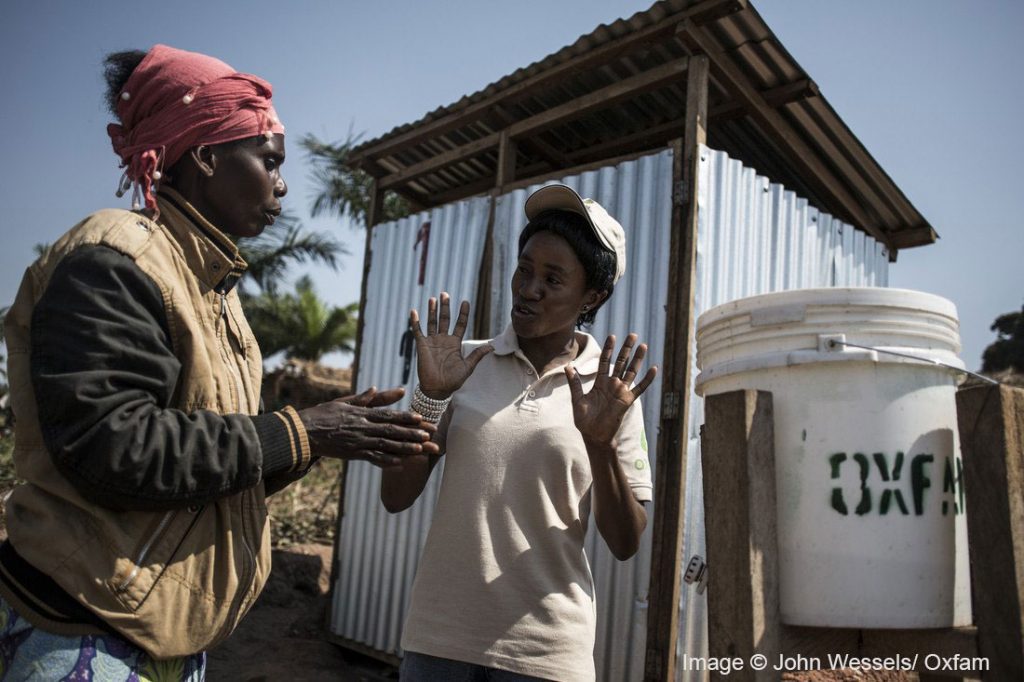 The group paid attention. They all knew Françoise. Her work as a Public Health Promoter also involved going from household to household, speaking to people about hygiene in the home. She told us that when Oxfam arrived, people were going to the toilet in the river and at the same time collecting water to drink. Unsurprisingly, there was a big cholera outbreak. We met Valerie*, a cholera survivor, who told us about the lack of hygiene awareness and the impact of Françoise’s work. “The people from our village didn’t think it was wrong to drink water from the river, amid the danger. The water was the colour of my jacket [brown].” “If I take you to the graveyard, you will be shocked. We used to bury up to five people a week.”Françoise took us through the preventative measures against cholera, and emphasised the need to drink clean, treated water. She also taught us about hygiene. I used this knowledge to train my family. She really helped my family and me – she gave me health ‘riches,’” Valerie said. Back at the water point, we filmed Françoise walking towards the crowd as she described how she did her job. She graciously repeated the same action several times, so we could capture the right shot. Between takes, Françoise didn’t hesitate to help out when she saw someone struggling.“Oh, I can tell that container is heavy… who will carry this for you?” she said. “Remember if you do not clean your containers the water purifier will not be effective as germs will still be present. You know that, right? Okay. Let me help you.” Before working for Oxfam, Françoise had worked on a counselling and therapy programme for conflict survivors. The Oxfam job appealed to her, because she would also be working with people, “Talking and teaching – it’s my field.” she told us.Later that day, we watched the community assemble in a small hut to listen to Françoise. She engaged the crowd with drawings and songs, employing different techniques to encourage people to learn how to prevent the spread of disease. During an interview we filmed with Françoise, she revealed how her own experiences motivated her work. “I am passionate because I have been a victim myself. I was in a refugee camp and I saw a lot of people dying of disease. Humanitarian workers came to carry out awareness-raising which improved the situation – that’s why I got interested in this job.” Françoise was not an astronaut, looking at the earth from space; she was not a scientist, looking at matter under a microscope; but she applied the same pioneering perspective to the community she belonged to; carefully observing what really makes a difference, quietly improving and saving lives. “We’re all the same and we have all experienced the same difficulties.” she said, “So, when you find yourself in a situation where you are able to help yourself and others, you have to help them in the same way. I’m very proud of the work that I do. I am proud because helping the population helps me too. I gain the knowledge and it broadens my expertise. It feels like being part of a family.” I recently received the news that Françoise passed away a few months ago. On this World Humanitarian Day, I want people to know about the incredible work she did. Françoise was a real humanitarian. She was courageous and compassionate. She had the trust of the communities she worked with. And knew what mattered most. Françoise let us record her life for a day and we made this film. Please watch and share.
The group paid attention. They all knew Françoise. Her work as a Public Health Promoter also involved going from household to household, speaking to people about hygiene in the home. She told us that when Oxfam arrived, people were going to the toilet in the river and at the same time collecting water to drink. Unsurprisingly, there was a big cholera outbreak. We met Valerie*, a cholera survivor, who told us about the lack of hygiene awareness and the impact of Françoise’s work. “The people from our village didn’t think it was wrong to drink water from the river, amid the danger. The water was the colour of my jacket [brown].” “If I take you to the graveyard, you will be shocked. We used to bury up to five people a week.”Françoise took us through the preventative measures against cholera, and emphasised the need to drink clean, treated water. She also taught us about hygiene. I used this knowledge to train my family. She really helped my family and me – she gave me health ‘riches,’” Valerie said. Back at the water point, we filmed Françoise walking towards the crowd as she described how she did her job. She graciously repeated the same action several times, so we could capture the right shot. Between takes, Françoise didn’t hesitate to help out when she saw someone struggling.“Oh, I can tell that container is heavy… who will carry this for you?” she said. “Remember if you do not clean your containers the water purifier will not be effective as germs will still be present. You know that, right? Okay. Let me help you.” Before working for Oxfam, Françoise had worked on a counselling and therapy programme for conflict survivors. The Oxfam job appealed to her, because she would also be working with people, “Talking and teaching – it’s my field.” she told us.Later that day, we watched the community assemble in a small hut to listen to Françoise. She engaged the crowd with drawings and songs, employing different techniques to encourage people to learn how to prevent the spread of disease. During an interview we filmed with Françoise, she revealed how her own experiences motivated her work. “I am passionate because I have been a victim myself. I was in a refugee camp and I saw a lot of people dying of disease. Humanitarian workers came to carry out awareness-raising which improved the situation – that’s why I got interested in this job.” Françoise was not an astronaut, looking at the earth from space; she was not a scientist, looking at matter under a microscope; but she applied the same pioneering perspective to the community she belonged to; carefully observing what really makes a difference, quietly improving and saving lives. “We’re all the same and we have all experienced the same difficulties.” she said, “So, when you find yourself in a situation where you are able to help yourself and others, you have to help them in the same way. I’m very proud of the work that I do. I am proud because helping the population helps me too. I gain the knowledge and it broadens my expertise. It feels like being part of a family.” I recently received the news that Françoise passed away a few months ago. On this World Humanitarian Day, I want people to know about the incredible work she did. Françoise was a real humanitarian. She was courageous and compassionate. She had the trust of the communities she worked with. And knew what mattered most. Françoise let us record her life for a day and we made this film. Please watch and share.
